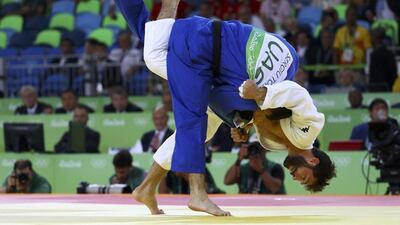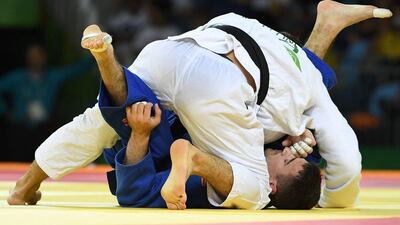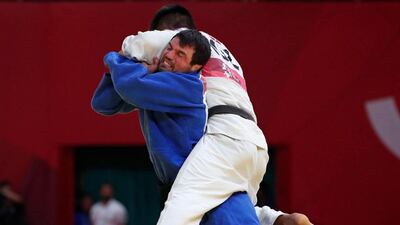The governing body for judo in the UAE will continue to rely on naturalised judokas to keep the nation’s flag flying high at the world stage.
The UAE created history when Moldovan-born Sergiu Toma won bronze at the 2016 Rio Games to become only the second Olympic medal winner for the nation after Sheikh Ahmed bin Hasher's gold in double-trap shooting at the 2004 Athens Games.
Victor Scvortov and Ivan Remarenco, compatriot and teammates of Toma at Rio, will have another go at Olympic glory after booking their places for the Tokyo Games.
Before Toma’s success, Emiratis Saeed Al Ketbi and Humaid Al Derei had represented the UAE at 2008 Beijing and 2012 London, respectively. However, the two Emiratis made it to the Olympics through the continental quota.
Nasser Al Tamimi, general secretary of the UAE Wrestling and Judo Federation, said the reason behind having naturalised judokas was to create a pathway to develop the country’s youth into Olympic medal prospects.
"After the London Games, we made a study on how we can bring Olympic medals to the UAE in judo," Al Tamimi told The National.
“Going by our local talent pool, we didn’t find any athletes that we could go into an Olympics with any hope.
“If our objectives was to win medals at the Olympics, we needed athletes who can train and compete at the top flight 340 days per year. We could neither find local judokas at that level nor the commitment from them to continue as full time athletes.”
Al Tamimi explained the strategy was to create an environment and culture to integrate them with the naturalised judokas and train with them to become Olympic medal prospects.
“We need to motivate our chaps,” he said. “They need to come face-to-face with Olympians. Look at them as champions and role models.
“Obviously it’s not going to happen overnight but we hope to have a strong Emirati representation, perhaps at the 2024 or 2028 Olympics.”
The UAE federation recruited Toma - who quit last December after suffering another back injury - Scvortov and Remarenco in 2013, and the trio qualified for Rio 2016.
The UAE federation is also scouting for new talent with the aim of fielding a strong squad at the 2022 Asian Games and 2024 Olympics.
Bit it hasn't always been smooth sailing. When Toma created history for the UAE at Rio, some locals took to social media objecting to the concept of winning a medal through an athlete of foreign origin.
Al Tamimi defended the federation’s strategy by saying they were creating a pathway for Emirati youth.
“It is a common for even some established judo nations like Russia, USA, France and Germany, to naturalise judokas from other countries," said Al Tamimi, who was among the first Emirati basketball players to receive professional contracts in the 1980s and represented his country for more than a decade.
“It’s not only judo but it happens in all sports. In today’s world, you can’t create champions without having any of your own.
“If you want to be successful at the Olympics, there should be continuity. Kids need to look at champions as role models to inspire them to become future Olympians.”
Al Tamimi insisted their objective is to integrate the country’s youth with the naturalised athletes and work their way up.
“We know this through our experience after following the preparation of our naturalised judokas,” said Al Tamimi, who is set to complete his PHD in Sports Management at the Cairo University.
“We are confident somewhere down the line we’ll find our local judokas reach that level. But until such time we may use naturalised athletes to keep the UAE flag flying at the Olympics.”
A new pathway
The Judo Federation was amalgamated with the Wresting Federations when the latter was founded in 2000 under a new board, headed by Mohammed bin Thaloob Al Derei.
“Before that, not much was done to develop judo,” Al Tamimi said. “Judo and wrestling are both in the Olympics and our objective was to work on a new strategy from the onset.
“We already achieved that objective with a medal at Rio. It was indeed a massive accomplishment. The entire judo world was surprised we could to that in a very short period of time.”
After two decades, the federation has made steady progress at grassroots level.
The judo school programme is well established and supplemented by the federation’s training centres and judo classes at clubs across the country.
The federation’s judo calendar spans from September to April and consists of the national league comprising 14 competitions, the President’s Cup, the Japanese Ambassador’s Cup and two or three Open Championships.
The highlight is the Abu Dhabi Grand Slam, which was to be held in October and is now rescheduled for early next year after the coronavirus pandemic.
According to Al Tamimi, they have around 500 young judokas who train seriously for international competitions.
“We have strong squads in the junior and youth divisions, and we are confident some of them can go all the way to compete in the world circuit,” he said.
Among them is 19-year-old Maitha Al Nyadi, who is the leading Emirati female judoka. She is currently ranked No 183 in the world and has completed her first year at Tokai University in Japan.
Ahmed Jasem Al Thumairi and Rashed Al Hosani are two rising stars in the Under-17s, while Zayed Al Naqbi and Ali Al Darmaki compete at youth level and have been earmarked as potential future champions.
New headquarters
The UAE Wrestling and Judo Federation will soon have their own headquarters constructed at a cost of Dh20 million on a one hectare plot in Bani Yas.
The multi-purpose complex will have state-of-the-art training facilities, an indoor stadium that can also be used for basketball, volleyball, futsal, and a fully equipped sports clinic, hotel and a hypermarket.
“It is centrally located in the middle of five townships and we are very excited to reach another milestone since the new board was appointed in 2000,” Al Tamimi said.
“We are expecting it to be completed next year in January or February. We’ll host most of our local competitions and all the international competitions, and also hire the facilities for teams and national federations from overseas. There is a demand for such facilities in the UAE.”












